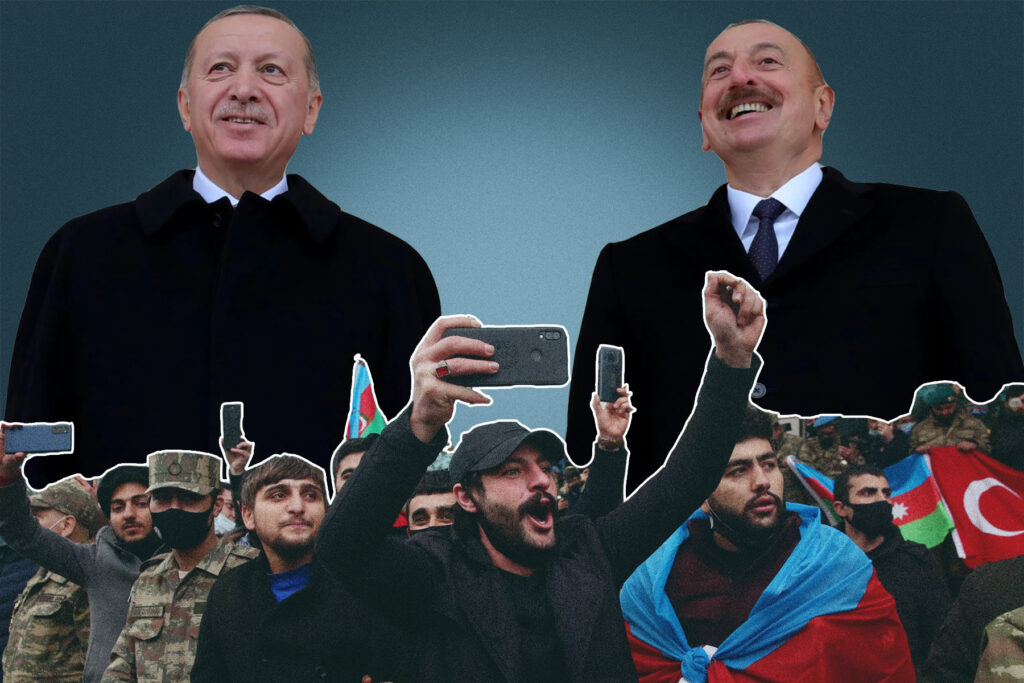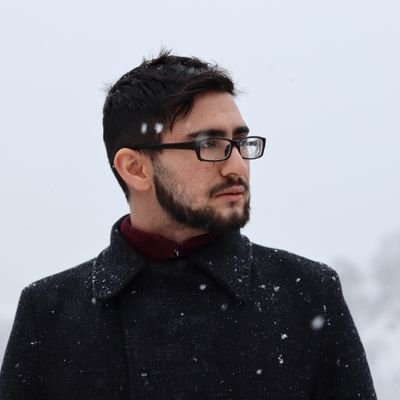Ilham Aliyev’s government has never enjoyed such mass support as it does now. With the Victory Parade was its crowning moment, it is now obvious that, at present, any opposition to the authorities is unthinkable. But even in the new Azerbaijan, there are faint glimmers of hope.
Ilham Aliyev inherited power in Azerbaijan after the death of his father, Heydar, in 2003. The turbulence of this transition was overcome through the brutal suppression of mass opposition protests. Upon securing his rule, Ilham Aliyev pursued anything but a coherent political ideology. Rather, he articulated disparate conservative elements already present in Azerbaijani discourse while deflecting blame on the 1992–1993 government for the loss of Nagorno-Karabakh and condemning its contemporary successors for a desire to ‘return to chaos’.
Through this elitist-authoritarian manner of governance, characterised by the clear division and delineation between the elites and government officials on one side, and the so-called ordinary people from the other, the ruling party secured the passive acceptance of its rule of the majority of Azerbaijani citizens.
In line with many other authoritarian regimes, the Aliyev government was not interested in active popular support. Instead, the authorities sought to promote public disengagement in political processes (such as elections) and a general delegitimation of the formal political realm. The resulting scepticism toward the potential of the opposition among the public helped the ruling regime to remain in power even without being truly popular, all the while silencing potential political rivals with little fear of a social backlash.
Cracks emerged in this relatively stable order, which had endured in the country since Heydar Aliyev came to power in 1993, by the late aughts and throughout the 2010s — especially as the country entered economically turbulent times, in the wake of lower oil prices (the country’s most profitable commodity). New, if small protest movements focused on social issues emerged, from the ‘Stop Soldier Deaths’ protests in 2013 to the last massive protest in Baku in October 2019, and passive dissatisfaction with staged elections grew to an all-time high.
But whatever possibilities such social contradictions held were wiped away in the Second Nagorno-Karabakh War. In post-war Azerbaijan, the whole logic of governance has been transformed, and the public has an entirely new vision of Ilham Aliyev and his government. Indeed, in a recent meeting with OSCE Minsk Group representatives, Aliyev was correct when he stressed that ‘there is an absolutely new situation in the region.’
A populist turn
Ilham Aliyev, a Russian-speaking graduate of Russia’s elite MGIMO university, used to be criticised by his opponents for ‘staying away from the actual people of Azerbaijan’ — but such claims ring hollow now. From the beginning of the war, Aliyev’s popularity surged, reaching astronomic new heights. In his wartime speeches, Aliyev, when speaking of the enemy, extensively used metaphors and expressions, which have become part of a new vernacular in Azerbaijan.
Phrases like, ‘we are chasing them like dogs’, or ‘then what happened, Pashinyan? The status went to hell, it failed, it was shattered to smithereens’, induced a state of popular euphoria. He was no longer an elitist strongman, who stays away from the rowdy mob, but a popular leader whose speeches mirror the long-lasting desire for Nagorno-Karabakh and revenge upon the enemy.
As he shared the stage with Turkish President Recep Tayyip Erdoğan, a populist authoritarian par excellence, during the Victory parade, Aliyev’s own newly minted populism has become only too obvious.
Now, with the public’s desire for Nagorno-Karabakh fulfilled, the ruling party is on the hunt for new ideological goals that will maintain the popular fervour. Aliyev’s claim that ‘Zangezur, Goycha, and Yerevan districts are our historical lands’, are an example of this new model of the rule in action, while Erdogan recitation of a poem laying claim to northern Iran signals a similar possible direction.
Ironically, the populist turn may make power more difficult to maintain, than the previous more passive mode of rule. Aliyev still lacks a coherent ideology, and further territorial claims press against the reality of Russian peacekeepers to the west and Iranian soldiers to the south. Most likely, we will witness a variety of anti-liberal ideological turns from the government as it tries to maintain this high watermark of popularity as well as a propaganda focus on something that is more practical — the rebuilding of the new-won territories.
The end of the opposition
Exactly a year ago, different activist communities were reflecting on the upcoming parliamentary elections: about mobilising strategies and possible ways of cooperation within the oppositional groups and parties. Now, a year later, these dreams are no longer valid, and an oppositional strategy with popular resonance is not even imaginable.
Attempting to adapt to this shift in the political terrain, opposition ReAl party’s chair Ilgar Mammadov has leaned into the new dominant discourse — trying to be holier than the pope, so to speak — by making a straightforward irredentist territorial claim to Armenia. Others have followed in his stead, though to a less extreme degree, criticising the Russian peacekeeping mission because it prevented the complete takeover of Nagorno-Karabakh — with recent skirmishes only intensifying this criticism.
Such rhetoric has no potential for a democratic and anti-authoritarian mobilisation, and this fact is evident for the opposition. The traditional political opposition, which has never had a fundamental ideological stance against the ruling authorities, have found themselves in a dead-end. In pre-war Azerbaijan, they accused Ilham Aliyev of hesitation in returning Nagorno-Karabakh and the surrounding occupied districts to Azerbaijani control — but now he has won that war. They accused him of being out of touch with the common people — now his speeches please people so much that they write meykhana and rap based on his expressions.
And even now, when they accuse him of secretly serving the Russian interests — he and Turkish President Recep Tayyip Erdogan stand side by side at the Victory Parade.
In Azerbaijan’s new reality, they have nothing to offer.
Glimpsing the future
A year ago, perhaps naively, I suggested that the traditional opposition should appeal to young progressives and activists in order to build a broad anti-authoritarian coalition ‘for the many’. In the new reality, those progressives who turned to the ‘no-war’ position during the war, have been marginalised, many of them losing nearly all credibility. Even now, when the war is over, they are still subject to fierce attacks.
One example of such an attack is the video by a popular Canada-based Azeri video blogger, released on December 11. Titled ‘Victory and A Few Sluts’ the video viciously attacks peace activists and the news organisations who give them platforms (including OC Media) it has reached over 100,000 views.
Calling supporters of peace ‘sluts’ has become commonplace. AzLogos, a website that positions itself as ‘an intellectual platform of Azerbaijanis across the world’, and is run by a writer that once wrote a novel about the relationship of an Azerbaijani and Armenian gay couple who emigrated to Switzerland, has attacked peace activists repeatedly, most notably with an article titled ‘NoWar — Another Name of Being a Slut.’
In a situation, when politics in a sense of inner antagonisms and contestation, does not exist at all — even in a Schmittean sense as the external enemy has been defeated — Azerbaijan finds itself, for the moment, in a seemingly barren place.
And yet, despite the victory in war, the old social problems remain. In recent days, a number of videos have become viral. In one video, a soldier stationed in newly-won Jabrail complains about the rain-damaged tents they are forced to live in. In a different video, in newly-won Gubadli, asks for help — his family had been evicted because they could not pay their rent. A viral photo shows the miserable aid package that the Ministry of Social Protection sent to the family of a 26-year-old fallen soldier.
All these and more caused a wave of outrage on social media, the ‘quasi-totalitarianism’ Aliyev hopes for, it seems, is built on shaky ground. Dissent is still possible. Not that this augurs an imminent revolt, or even that the Azerbaijani public will see itself as a subject for change in and of itself. But these are glimmers of hope, nonetheless.
In 2013 the ‘Stop Soldier Deaths’ protests brought many Azerbaijanis into political activism, including me. Almost eight years later, in the new post-war Azerbaijan, it is clear that we need to start again.
The same old social inequalities and the same old authoritarian regime are with us, alongside new grievances. The emergence of a new protest movement will take time. For the new generation of activists, this history of failures that marks our generation — constrained as we were, by the question of Nagorno-Karabakh and a lack of ideological content in our demands, must not be forgotten if there is to be any hope of victory.
Aliyev is stronger than he has ever been, but his strength is not total and history keeps on its steady march — no matter how much he would like to freeze it.
The opinions expressed in this article are the author’s alone, and do not necessarily reflect the views of OC Media’s editorial board.




 24 December 2020
24 December 2020




